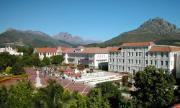
Bastion of Afrikaans approves ‘ diversity ’ policy for residences.
Stellenbosch University has finally been given the green light to accommodate more black students in its residences.
On Thursday night, by a margin of just four votes, the university ’ s new placement policy was endorsed after a heated special convocation meeting on campus that lasted five hours.
The white, mainly middle-aged and male lobby that has been trying to block the university’s attempt to accommodate more black students was outvoted.
Vice-chancellor Arnold Schoonwinkel told the gathering that the university intended to change the “diversity profile on campus”.
“Excellence is strengthened through diversity. This is about language, race and diversity . . . 58% of first-years on campus are first-generation students. They need to have access to residences because they are vulnerable,” Schoonwinkel said.
The university has 23 residences in Stellenbosch — nine for men, 12 for women and two that accommodate both male and female students.
The racial breakdown of students in the residences is 66% white, 23% coloured, 10% black and 1% Indian.
The controversial new placement policy is regarded as highly significant because students in residences are at the heart of shaping the tradition and culture on campus.
Whereas academic excellence was the determining factor previously, the new policy has now set a wider range of criteria:
Academic merit (a minimum of 76% is currently required to get into a residence);
Whether the student is a South African citizen;
Language preference (of the 28 000 students, 13 000 are Afrikaans); Ethnicity; and Whether the applicant is a first-generation student and whether he or she has a bursary.
Some opponents of the new hostel policy felt it was too vague and potentially discriminatory against white students.
In addition, critics said it could be seen as the reintroduction of racial classification.
About 300 people — mainly alumni who had voting rights — attended the meeting this week. Of them, 120 voted in favour of the policy and 116 against.
After the vote tally was announced, about 50 members of the audience got up and left the hall, a clear signal that those who had come to oppose the policy had not come to terms with it.
The university, one of South Africa’s premier tertiary institutions, has long been regarded as the cradle of Afrikaner leadership. Some of its more notable alumni include Andries Treurnicht — who became the leader of the Conservative Party — and former apartheid leaders Daniel Malan and Hendrik Verwoerd.
More recently, the university was harshly criticised by the likes of former president FW de Klerk when it decided to offer classes in English. De Klerk accused the university of deliberately handicapping Afrikaans.
Those who opposed the new accommodation policy showed themselves to be true to the university’s conservative reputation. One white speaker after the other stood up to express their fears of discrimination “on the basis of race, ethnicity or social origin”.
A former student who has three children studying at the university said his children “can’t get work in South Africa because they are white”.
But a white lecturer in the department of earth sciences took issue with the speaker, saying it was “an urban legend” that whites could not get work in South Africa. She said 90% of the students in her class were white and that the only two who could not find work last year were not white.
Another speaker, white and middle-aged, suggested that the university’s placement policy was an attempt to gain favour with the government and obtain a bigger slice of state subsidies.
The university’s student representative council supported the new policy, saying it was in line with South Africa’s constitution.
Rector Russel Botman told the gathering: “Students are telling us we should do more for transformation — these students asking are white.”
Botman’s administration has been plagued by allegations of racism and interracial violence on campus and he has repeatedly committed the university to transformation.
The residence placement policy has been hailed as a step in the right direction.
Dr Jerome Slamat, director of community interaction at the university, said listening to those who opposed the new policy reminded him of the days of the “swart gevaar”. “Stellenbosch belongs to all of us,” he said.
An upbeat Botman said the meeting on Thursday was the crowning achievement of many years of effort.
“I saw students themselves talking in favour of diversity and talking about the future of themselves and this institution,” he said.
“The vote in favour of the policy was important because the university ’ s culture and traditions are carried by its residences. The convocation meeting told us that the university is ready for change.”
Picture credit: sasec.org.za
- This article was published on Sunday Times.
